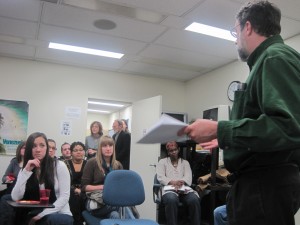Professor Tom Lavalle is a great man. He is soft-spoken, he has sparse beards that cover much of his chin, and he smiles a lot. And he speaks Chinese! He is an American Professor in my department and he learnt, speaks and teaches Chinese language and literature. Isn’t that amazing? I met him for the first time on Monday even though we had been communicating a lot through email, and even though his office is just a stone throw from mine. For all I know, we may have gone past or maybe even bumped into each other more than once since August without knowing. For sure, the image of him that I had in my head before meeting him was not of someone of such height and demeanour. Why I had the preconceived image in my head, I have no idea. All I know is that when I met him, I was pleased. He is a pleasant person to talk with.
 During the first email exchanges we had before we actually met, he had sent me these few translated poems from Chinese which I loved, so on meeting him, conversation inevitably turned to the subject of Chinese poetry and language and how it had influenced Japanese language and literature as well, especially in the form of writing. I learnt so many new things, about him, about China and about writing, language and culture. Why an American would be interested in Chinese poetry is not a question I would always ask, but I did ask for his own motivations, and I found them rooted in a craving for private space in the solace of words. He is a poet himself, writing in English, and his contact with Chinese writings had sparked a different kind of interest in him that has been sustained up to the present day. And because of him, students of this department now have the chance to learn Chinese language and culture at SIUE, and take field trips to a country of so much intriguing history.
During the first email exchanges we had before we actually met, he had sent me these few translated poems from Chinese which I loved, so on meeting him, conversation inevitably turned to the subject of Chinese poetry and language and how it had influenced Japanese language and literature as well, especially in the form of writing. I learnt so many new things, about him, about China and about writing, language and culture. Why an American would be interested in Chinese poetry is not a question I would always ask, but I did ask for his own motivations, and I found them rooted in a craving for private space in the solace of words. He is a poet himself, writing in English, and his contact with Chinese writings had sparked a different kind of interest in him that has been sustained up to the present day. And because of him, students of this department now have the chance to learn Chinese language and culture at SIUE, and take field trips to a country of so much intriguing history.
Because of meeting him, one day I hope to start learning Chinese. I don’t know where to start from though, whether on a lesson in good calligraphy or on a lesson in Chinese alphabets which I am very sure is larger than the English one. And unlike many of the students who register for the class, my motive will not really be in anticipation of, and preparation for the new world order where Chinese is spoken as a first language by all world citizens, but to access many of the different forms of expression of thought buried within the texts of old and classical Chinese poetry.
Well, maybe I lie when I say that, but how would you know?
“Drinking Wine” #4 of 4
Tao Qian (365-427)
Autumn chrysanthemums have beautiful color,
With dew on my clothes I pluck their flowers.
I float this thing in wine to forget my sorrow,
To leave far behind my thoughts of the world.
Alone, I pour myself a goblet of wine;
When the cup is empty, the pot pours for itself.
As the sun sets, all activities cease;
Homing birds, they hurry to the woods singing.
Haughtily, I whistle below the eastern balcony –
I’ve found again the meaning of life.
(Translated by Wu Chi-liu)
3 Comments to On Chinese Poetry so far. (RSS Feeds for comments in this post)